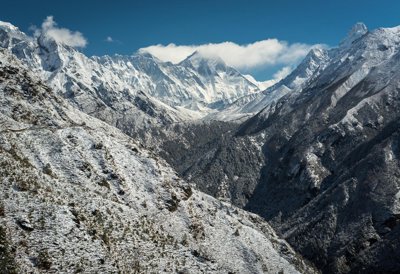How did you get to where you are now?
I was always passionate about physical geography, so after my A Levels I studied for a BSc Earth Science at Kingston University. During my degree I became fascinated by the behaviour and failure of sediments, so I went on to study for a PhD in Geography at the University of Southampton. My research examined how deforming sediments beneath glaciers contributed to fast ice flow and I spent lots of time looking at glacial deposits in Iceland, Norfolk and the Yorkshire coast. I spent four years working in the USA as a postdoctoral researcher, but it was my volunteer post in the US National Park Service that inspired me to move into public engagement and education. I have worked for 15 years at the Jurassic Coast World Heritage Site, developing and building learning programmes that help people of all ages understand why this is a very special place.
What do you do as part of your role?
Contrary to popular belief I am not always out on the coast every day gazing out to sea or looking for fossils! During a typical week, I spend time developing content for our media and communication channels. This might involve writing an article about fossil collecting for our magazine or even getting out onto the coast with my vlogging kit to record content about rockfalls and how to be safe out and about on the Jurassic Coast.
I also provide technical advice to museums, artists and our business partners on interpreting scientific content to ensure that any messages are accurate and authentic. All of our learning content and teacher training for schools is now managed by the Primary Science Teaching Trust, so I also provide technical advice when they need it. I also work as a freelance TV presenter and you might have seen me on BBC 4 Beach Live last summer broadcasting to a live audience of over 600,000 people!
Why did you choose geography/earth sciences? Why should others choose geography/earth sciences?
I chose geography because from a very early age I was fascinated with the stories that rocks could tell us about past environments that are now long gone. I love unravelling the hidden mysteries of landscapes and in fact I am proud of my geographical superpower! I can see where a glacier has moved across a landscape over five million years ago or tell you about an ancient desert system just by looking at a sandstone cliff. Learning about geography and earth science has given me that gift.
Geography and earth science underpin everything in how we manage our relationship with nature and evaluate the impact we have on the world around us. From plastic pollution to global climate strikes, if you have a background in geography you are empowering yourself to be equipped with the skills you will need for an uncertain future.
* This interview was undertaken in 2019 and was correct at the time of publication. Please note that the featured individual may no longer be in role, but the profile has been kept for career pathway and informational purposes.
Dr Anjana Khatwa
Job title: Programme Manager for Learning
Organisation: Jurassic Coast Trust
Location: Dorset, UK

